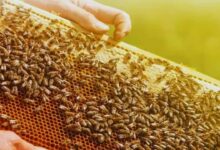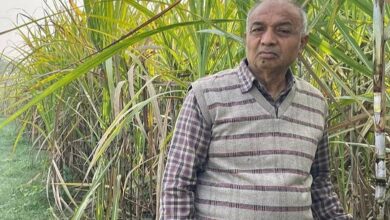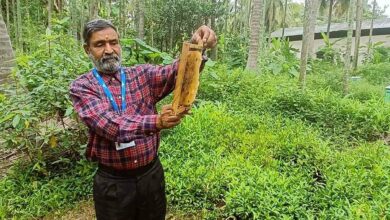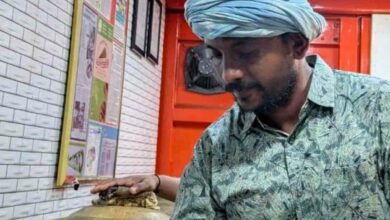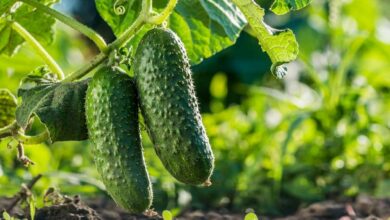Inspirational story: Jitendra Mann went from working as a dairy laborer to being an organic farmer and earning thousands of rupees
Inspirational story: These days, a lot of young individuals in our nation are successfully trying their hand at farming. Among them is Jitendra Mann, a resident of Panipat’s Gharmgarh village. He quit his work in the dairy industry to pursue a career in agriculture. On his 12-acre plot of land, he successfully cultivated a wide variety of fruits and vegetables, earning around 15 lakhs annually.
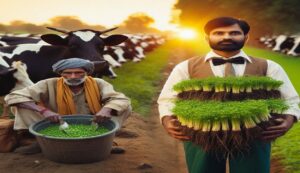
For nine or ten years, Jitendra began his career at Mother Dairy as a low-paid employee. “My salary at Mother Dairy was barely enough to save anything, and I was looking for an alternative to get a stable income,” Jitendra relates. In 2015, his uncle’s suggestion to build a polyhouse changed his life.
Overcoming Obstacles and Achieving Success
Jitendra started his polyhouse farming adventure with cucumbers, per his uncle’s advise, and quickly added additional fruits and vegetables, such berries and lemons. He dabbled with floriculture as well. “I grew gerberas, lilies, and carnations and marketed them in Ghazipur, Delhi,” he says. The road to victory was not, however, simple. At first, the lemon trees and berry bushes did not produce much. Jitendra went to the Ladwa Horticulture Department for assistance. They suggested that, in addition to planting saplings, he establish his own mother block—a special location set aside for the cultivation of genetically pure, healthy, and disease-free plants of a particular fruit type. Jitendra says, “The Ladwa Center’s support showed me a new path.” He overcame his problems and started to see results by adhering to this advice.
Next, Jitendra filled his field with Red Diamond guava trees. Each plant cost between one hundred and fifty rupees at the time. “Planting 700 Red Diamond guava plants in one acre cost around 1 to 1.5 lakhs, but with the 50,000 rupees grant from the Horticulture Department, I planted it successfully,” Jitendra recounts.
Jitendra now looks after 12 acres of farming with skill. He plants wheat and cumin on the remaining acreage and sets aside 5 acres for a fruit garden. He grows a wide variety of fruits in his orchard, such as pomegranates, peaches, mangoes, apples, papayas, oranges, lemons, and figs.
Jitendra’s Organic Farming Revolution
Jitendra says he likes organic farming and proudly states that no chemicals are used on his crops. “I use only organic manure, waste decomposer, and Jeev Amrit,” he underlines. His creative use of neem leaf spray guarantees organic insect control, demonstrating his commitment to sustainability.
The spirit of entrepreneurship and strategic marketing
In an effort to optimize his earnings, Jitendra has created a distinctive marketing plan. He has his own store, selling fruits including guava, peach, apple, and sweet lime, in addition to providing flowers to décor stores. Both direct client connection and quality control are ensured by this strategy. “Having my own outlet allows me to maintain high standards and fair pricing,” he says.
Three types of apples that Jitendra produces are available for sale in the market for between 150 and 200 rupees per kilogram. In addition, he grows mangoes of the Amrapali, Arunika, Ambika, Lalima, and Swarn Rekha types. He also raises Taiwan Pink, Red Diamond, and Hisar Safeda guava cultivars. Lal Hira, another name for the Red Diamond guava, retails for between 130 and 150 rupees per kilogram.
Additionally, Jitendra invested roughly 30,000 rupees to grow marigolds as an intercrop, earning him about 1 lakh. His revenue climbed even more when he added marigold intercropping, which proved to be successful.
Jitendra makes between 10 and 15 lakh rupees a year from working in nurseries and between 80,000 and 1 lakh rupees from growing wheat and cumin.
Motivating the Next Generation
Jitendra Mann’s transformation from a dairy worker to a prosperous organic farmer who makes thousands of rupees a year is proof of the potential of perseverance, ingenuity, and sustainability in farming. “Youth should definitely go for gardening because gardens are very important for our life,” Jitendra remarked, delivering a message to the younger generation. Jitendra Mann suggests farmers take up gardening after undergoing quality instruction and farm in a contemporary manner by acquiring precise market data.
The narrative of Jitendra provides prospective farmers across with priceless lessons and inspiration. He says, “Farming isn’t just my livelihood; it’s my passion,” inspiring others to pursue their goals.

